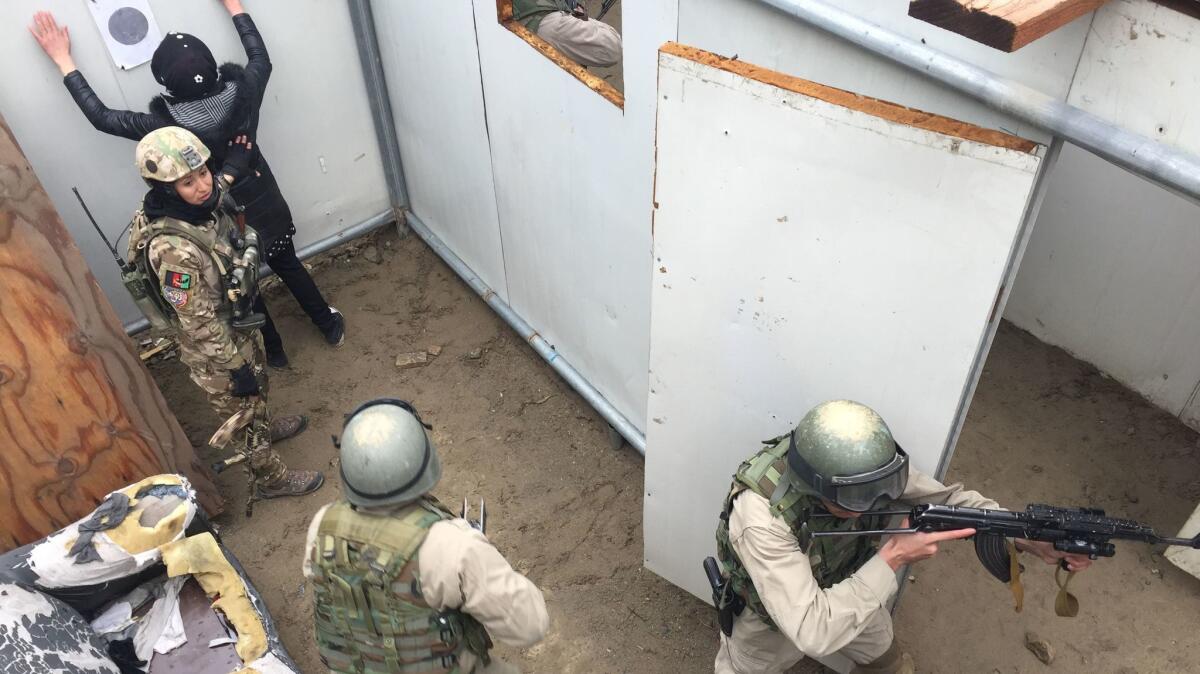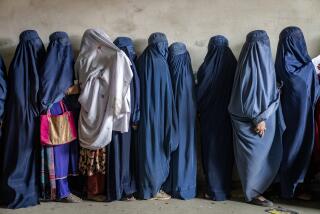In Afghanistan, an elite female police officer battles cultural taboos as well as the Taliban

- Share via
Reporting from Kabul, Afghanistan — Sgt. Monesa Kashefi was once afraid of gunfire. Now the 25-year-old has taken part in more than 1,000 combat operations in six years.
Kashefi is one of several dozen women serving in an elite Afghan police force, the Crisis Response Unit, that increasingly finds itself at the center of the country’s long war with Taliban militants. But Kashefi doesn’t just battle the Taliban. She is also up against Afghan traditions, which relegate women to domestic roles and near-invisibility in the body-length garment known as the burqa.
The U.S.-led military coalition in Afghanistan has long tried to increase the recruitment of women in Afghan security forces, but they have never made up more than 1% of forces. In 2016 alone, the United States budgeted $93.5 million to bolster the ranks of female soldiers and police in Afghanistan, according to the Special Inspector General for Afghanistan Reconstruction, a watchdog agency.
But the office said in a report last year that female recruits leave the security forces because of “opposition from male relatives, problems with male colleagues, low pay, family obligations, lack of promotion or meaningful assignment opportunities, and a lack of training and security.”
The Crisis Response Unit is often the first to respond to major attacks, as it did last month when Taliban militants raided a northern base and killed more than 100 soldiers. The unit has come under pressure as Afghanistan’s conventional soldiers and police face increasing casualties from the Taliban and allied insurgents.
Officials would not disclose the total number of commandos in the Crisis Response Unit, but they are believed to number about 5,000, spread across all 34 Afghan provinces. The unit has filled only 83 of the 254 positions set aside for women.
Kashefi eschews the burqa while on duty, instead wearing fatigues and a black head scarf under her helmet, while carrying 33 pounds of equipment including an antiballistic vest, AK-47 assault weapon, radio and canteen. She marches through mud, water and forests “the same as men do,” she said during a recent interview in Kabul, on a break between missions.
While she misses her family — deployments keep her away from her three children for months at a time — she said she loves her job.
“I’d love to spend my entire life in my unit,” she said.
Commanders say Kashefi and other women fill a crucial role by conducting body searches of women during raids on suspected insurgent houses. Under the strict Islamic laws observed in Afghanistan, male officers cannot search women.
Kashefi described a recent operation in Logar, the rugged eastern province where she is based along with about 450 commandos. At a house where two Taliban militants were believed to be hiding, a woman came to the door and it fell to Kashefi to speak with her.
When Kashefi asked to search her, the woman fell to the ground and feigned a stomachache, she said. Kashefi searched her anyway and found a pistol and two hand grenades on her body.
She and the two men were quickly arrested, Kashefi said. The woman started crying and said that Taliban fighters were forcing her to host and cook for them.
It is not common for Afghan women to spend weeks at a time away from home or work alongside men, although Kashefi said she enjoys the respect of the men in her unit, calling them “brothers.”
A senior Crisis Response Unit commander, Maj. Gen. Sayed Mohammad Roshandil, praised Kashefi’s courage. He said she once helped carry a male officer who was wounded in a combat operation — an unusual thing for an Afghan woman to do, but a sign of her dedication.
“The women in our units are really brave,” Roshandil said.
But officials acknowledged that women in the security forces are not frequently promoted, and not all enjoy such support.
One female Afghan Interior Ministry official, who spoke on condition of anonymity to discuss the sensitive issue, said women in the Afghan special forces often struggled to maintain their Islamic modesty and also faced sexual harassment from senior officers.
“Some senior officials invite their female colleagues for night parties,” the official said. “If the ladies say no, they never get promoted. Unfortunately, some women surrender to their seniors’ demands.”
Kashefi is the sole breadwinner in her family. Her monthly salary of about $640, along with a small bonus for each combat operation, supports her mother, brothers and three young children, who live with family members in Kabul. (She won’t publicly discuss her marital status.)
She never thought of taking any other job, having joined the special forces after leaving school in ninth grade.
“I chose to join the military because I want to fight,” she said. “I fight for peace.”
ALSO
Afghan woman risks all to bring color to war-torn Kabul with her street art and feminist murals
In Afghanistan, women face entrenched harassment
U.N. says Afghanistan’s court system fails women
Faizy is a special correspondent. Times staff writer Shashank Bengali contributed to this report from Mumbai, India.
More to Read
Sign up for Essential California
The most important California stories and recommendations in your inbox every morning.
You may occasionally receive promotional content from the Los Angeles Times.










